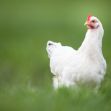Remember the childhood nursery game that begins, “This little piggy went to market?” If that little piggy wants to be sold in California, regardless of where it was raised, the Ninth Circuit has ruled that its producers must meet a state law that prevents cruelty to animals that are raised using “extreme methods of farm animal confinement.”
Writing for a unanimous three-judge panel, Judge Sandra S. Ikuta denied a motion from the National Pork Producers Council and the American Farm Bureau Federation to overturn the United States District Court for the Southern District of California’s dismissal of their suit for failure to state a claim of action. Plaintiffs sought a declaratory judgment and injunctive relief, arguing that California’s Proposition 12, passed in 2018, violates the “dormant Commerce Clause” of the Constitution. This term is applied to state laws that are constitutional if they do not discriminate against interstate commerce nor pose undue burdens on it, even in the absence of federal legislation that regulates the activity.
Proposition 12 was designed to prevent cruelty to abused farm animals and activities that “threatened the health and safety of California consumers,” and increased their risk of contracting diseases from the slaughtered animals. The bill also hoped to reduce associated negative fiscal impacts on the state. Ikuta explains that the law prohibits businesses from selling products, including pork meat, unless it was produced in compliance with how sows must be housed.
Plaintiff/appellants argued that Proposition 12 “impermissibly regulated” out-of-state pork production because it caused farmers across America to “change their regulations” in order to meet standards imposed by California. They say this is important because California produces very little of its own pork, even though residents of the state consume 13% of all the pork eaten in the nation. They reported that California only breeds 1,500 sows per year, while the slaughter of the litters of 673,000 sows is needed to meet the state’s demand. The pork producers also claim that Proposition 12 imposed “excessive burdens on interstate commerce,” because it boosts operating costs that are not related to human health.
Ikuta’s opinion includes a lengthy discussion of the Commerce Clause. She explains that there are “two primary principles” that govern when states are allowed to regulate interstate commerce, a power normally reserved for the federal government. First, state laws may not discriminate against interstate commerce. Second, they may not “impose undue burdens on interstate commerce.” She explains that non-excessive state laws that “even-handedly regulate to effectuate a legitimate local public interest will be upheld.”
Appellants do not argue that Proposition 12 discriminated against out-of-state pork raisers, thereby nullifying the first acceptable principle. They base their argument on the second—that which imposes undue burdens on out-of-state pork farmers. Ikuta said that this narrows the court’s task to a determination of whether appellants “plausibly pleaded a dormant Commerce Clause claim” because the California law has an “impermissible territorial effect.”
The judge reviewed precedents from milk and liquor sellers in New York, and a price-fixing claim from Connecticut. She said the language in these cases was “too general” to be applied here and added that the U.S. Supreme Court meant the clause to apply only to “price control or price affirmation” laws. She said the Ninth and Tenth Circuits have both ruled that state laws that neither “dictate the price of a product” nor “tie the price to out-of-state prices,” may not be applied to arguments centered on extraterritoriality” because “Proposition 12 is neither a price control or price-affirmation statue…“It neither dictates the price of pork products” nor ties their price to pork sold in other states, she writes.
Ikuta then dismisses appellants’ arguments based on what they call the “unique nature” of the pork industry. They claim their business, unlike others, is ‘highly interconnected” because the various parts of a hog are often shipped to many states. They argue that every hog must therefore meet California standards, even though no other state has enacted requirements similar to Proposition 12. Upholding California’s law would mean that producers would incur the “additional costs of segregating” California products, while 87% of all pork is consumed outside California. This, they claim, is another example of excessive “extraterritorial impact.”
This argument, too, was unpersuasive. The opinion finds that “such upstream effects do not violate the dormant Commerce Clause.” Ikuta writes that changes in California’s pork sales are also not “impermissible extraterritorial effects.” She notes that California reached a similar conclusion in a case about force-feeding ducks to enlarge their livers. She said that law, too, precluded a “more profitable method of operation …rather than effecting the interstate flow of goods.” In short, “increased compliance costs, without more, do not constitute a significant burden on interstate commerce.”
The judge also discussed the regulations that pork producers must meet in order to sell their goods in California. They must be certified by an agent of the state and comply with recordkeeping rules. These requirements are also not impermissible territorial effects. She found other arguments unpersuasive because they applied to practices that occurred wholly outside the state.
Appellants' final argument holds that the California law “poses a risk of inconsistent regulations that (would) undermine a compelling need for national uniformity.” The judge responded that cases meeting this test generally affect taxes or interstate transportation, and the pork industry is not analogous to situations “where uniform rules are crucial.”
Turning to cost, the pork producers project that meeting compliance with Proposition 12 “would result in a 9.2% cost increase” that would be borne by consumers. Higher costs at the grocery store, though, do not substantially affect “the free flow of commerce from state to state.”
In her closing, Ikuta writes, “While the dormant Commerce Clause is not yet a dead letter, it is moving in that direction.” She says that critics say such laws are “unmoored from any constitutional text” and cause “policy-laden judgments that (courts) are ill-equipped and arguably unauthorized to make.” Proposition 12 does not discriminate against out-of-state activities or regulate them and it does not impede the flow of interstate commerce or interfere with national laws. But arguments about the dormant Commerce Clause are for the future. For now, expect barbequed spareribs and BLTs to strain budgets a bit more.






